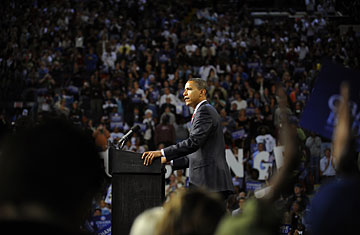
Senator Barack Obama speaks during a rally at the Mellon Arena in Pittsburgh on Oct. 27
It was fitting that Barack Obama brought his closing-argument speech to Pittsburgh: this is a city of many lives, one born in a cradle of steel and promise that collapsed and rose again and knows something about reinvention. "The American story has never been about things coming easy," Obama said. "It's about seeing the highest mountaintop from the deepest of valleys." This hilly city is as good a place as any to come for that kind of view. It is, according to the August census report, the fifth-poorest city in the country, and yet it ranks as among the most livable. A building that houses the near homeless is having trouble making its mortgage payments, and yet in one survey its location was the only northeast metro area that saw home prices rise last month. You want to see hope and fear arm-wrestling each other? Come to Pittsburgh.
Earlier in the day in Ohio, John McCain had warned of the dangers of one-party rule and come up with a new character to fuel his campaign: Barack the Redistributor, a man "more interested in controlling wealth than in creating it." But Obama, while still hitting McCain on the economy, chose to launch a broader attack against his opponent, describing McCain as having an intellectual bankruptcy that has left him dependent on small change. "If you can't beat your opponent's ideas, you distort those ideas and maybe make some up," Obama said of McCain's tactics. "If you don't have a record to run on, then you paint your opponent as someone people should run away from. You make a big election about small things."
And then Obama turned McCain's attacks back on him. The way out of this ditch, Obama argued, is by rewarding drive and innovation — and by making sure that businesses look out for workers and play by the rules. "That's how we've always grown the American economy — from the bottom up," Obama said. "John McCain calls this socialism. I call it opportunity, and there is nothing more American than that." And the crowd raised the steel roof of the Mellon Arena.
Obama set up a row of false choices to knock down like so many bowling pins — though this time his arm was better than it was back at the Altoona bowling alley earlier this year. "We don't need bigger government or smaller government," he said. "We need a better government." On taxes: "The choice in this election isn't between tax cuts and no tax cuts," it's whether we reward wealth or work. On education, the choice isn't more money or more reform — "our schools need both." And on the war, the choice isn't isolation or endless war: "I will never hesitate to defend this nation, but I will only send our troops into harm's way with a clear mission and a sacred commitment to give them the equipment they need in battle and the care and benefits they deserve when they come home."
Obama is the master of giving people some of what they want, enough to make the common ground seem sufficiently hospitable for them to agree to try it out for a while. So where one hand giveth, the other hand holds the price tag. Yes, we need to give troubled kids better opportunities, he says, but parents have to turn off the TV and weigh in and get involved. Yes, the government needs to drive an alternative-energy economy, but we have to turn off the lights and turn down the heat. Yes, we can argue, but we also have to listen.
The campaign is in its final week, and it's been an extraordinary ride — so extraordinary that it's easy to forget that it began with a skinny state senator with a funny name and a lot of teeth giving an unforgettable speech at the Democratic convention in Boston four years ago. When Obama stood before his party elders and declared that "there's not a liberal America and a conservative America — there's the United States of America," he was talking to a crowd of party faithful inflamed with hatred for George W. Bush and eager to fight every campaign as an all-out war on the Republican Party: crush them, flay them, eat their children. It was a first chance to see who were his potential friends and who would be his enemies.
Four years later, Obama has returned to the field where he redrew the lines. He has gone back to promising politics that does not scorch the earth and scar the soul. It's idealistic to the point of corny, except that, especially now, you get the feeling that the reason he's drawing crowds of 50,000, 75,000, 100,000 — even in purple and red states — is that people want to see what Different might look like. McCain and Palin tried to build fences, looking for safe ground; Obama bulldozed them in search of common ground. "Despite what our opponents may claim, there are no real and fake parts of this country," he said. "We are one nation, all of us proud, all of us patriots. There are patriots who supported this war in Iraq and patriots who opposed it; patriots who believe in Democratic policies and those who believe in Republican policies. The men and women who serve in our battlefields may be Democrats and Republicans and independents, but they have fought together and bled together and some died together under the same proud flag. They have not served a Red America or a Blue America — they have served the United States of America."
In about a week, we'll find out how many countries we really are.
